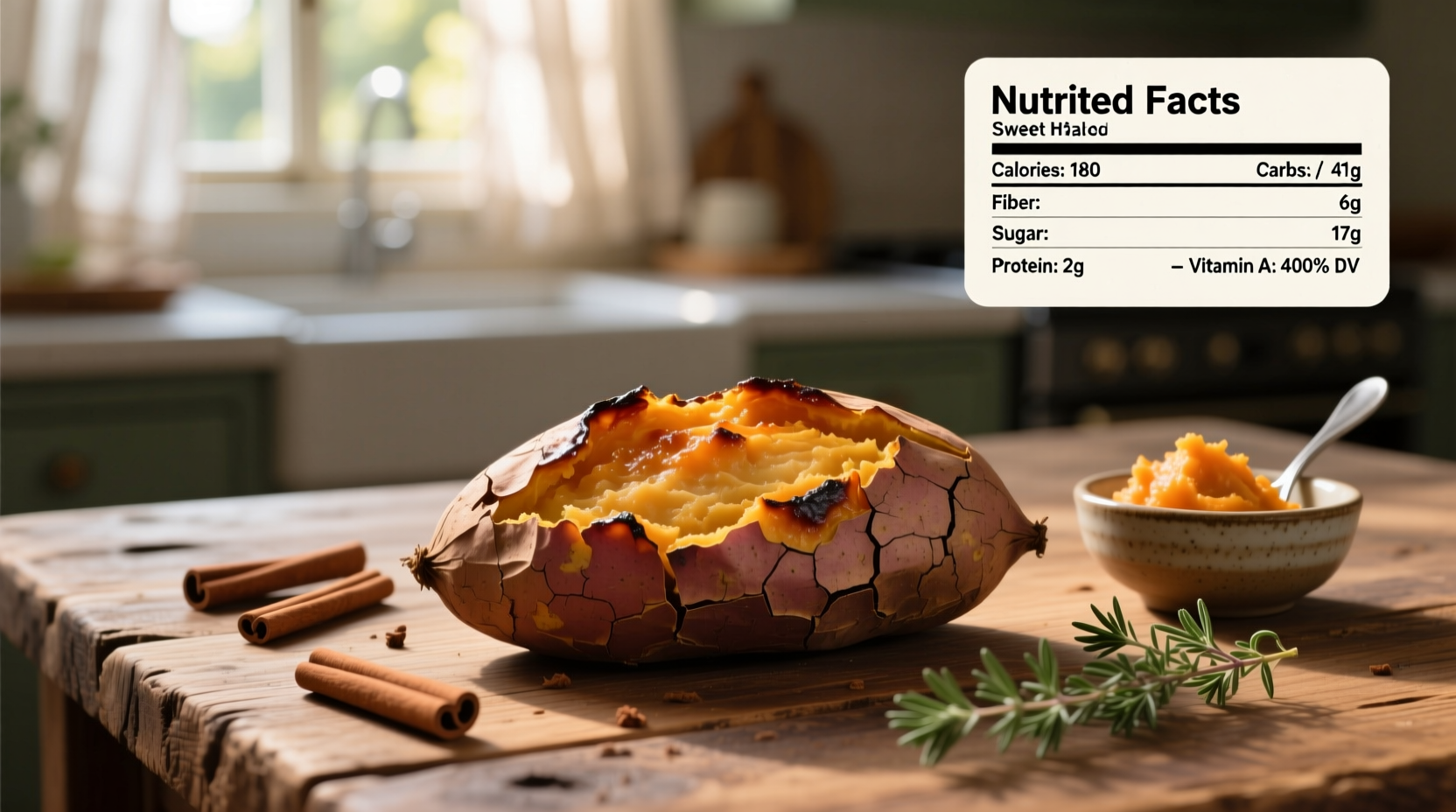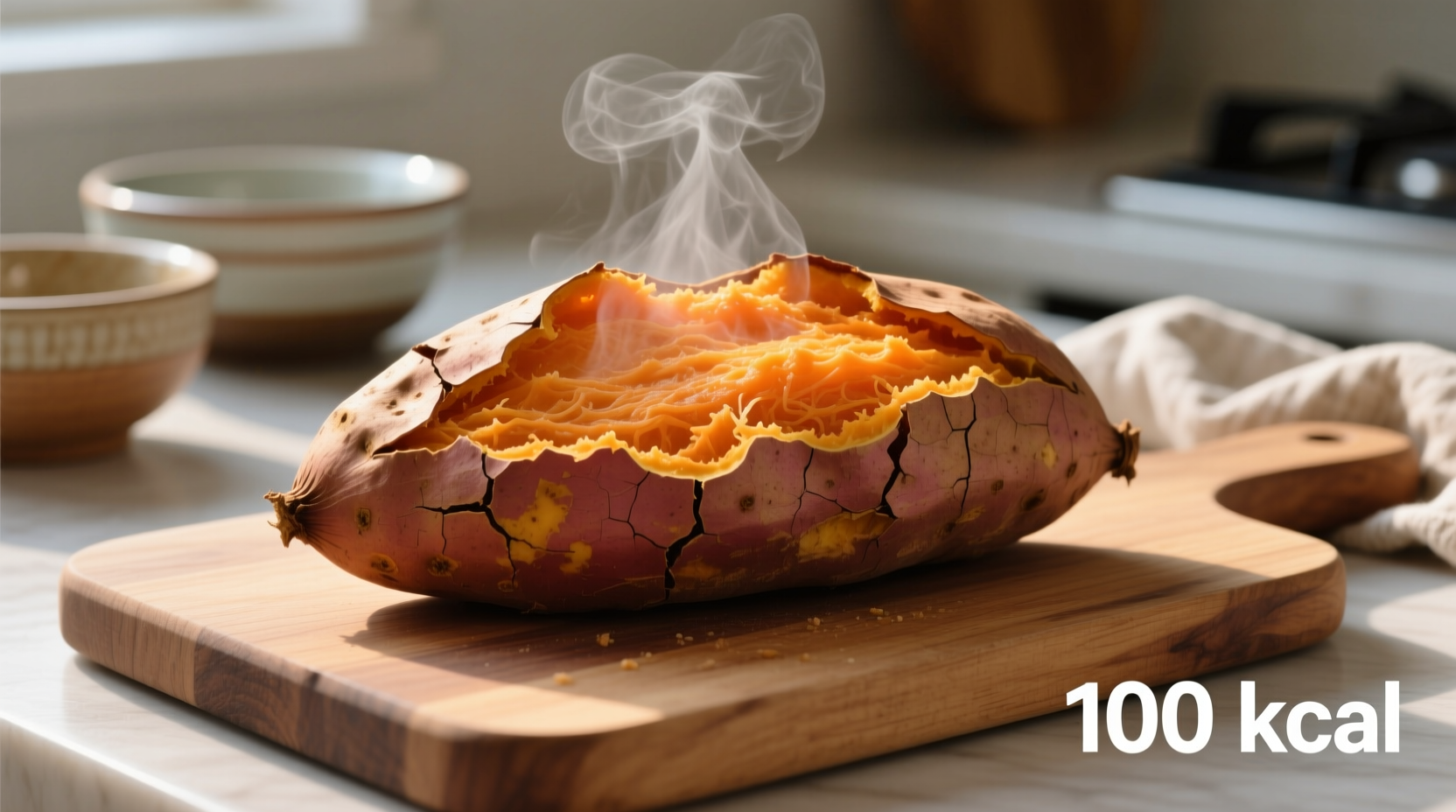Understanding the precise calorie content of sweet potatoes helps health-conscious eaters make informed dietary choices. Whether you're managing weight, tracking macros, or simply curious about this popular superfood, knowing exactly what you're consuming matters.
Breaking Down Sweet Potato Calories by Serving Size
Calorie counts vary based on preparation method and portion size. The USDA FoodData Central database provides these standardized measurements for raw sweet potatoes:
| Serving Size | Calories | Carbohydrates | Fiber |
|---|---|---|---|
| 100 grams (raw) | 86 kcal | 20.1 g | 3.0 g |
| 1 medium (130g) | 112 kcal | 26.1 g | 3.9 g |
| 1 cup cubed (133g) | 114 kcal | 26.8 g | 4.0 g |
| 1 large (180g) | 154 kcal | 36.2 g | 5.4 g |
This nutritional profile makes sweet potatoes an excellent choice for those seeking sustained energy without excessive calorie intake. The complex carbohydrates provide gradual glucose release, helping maintain stable blood sugar levels compared to refined carbohydrates.
How Cooking Methods Impact Calorie Content
Preparation technique significantly affects the final calorie count. Understanding these variations helps you make informed choices based on your nutritional goals:
- Baked sweet potato (130g): 130 calories - Minimal moisture loss concentrates nutrients and slightly increases calories per gram
- Boiled sweet potato (130g): 103 calories - Water absorption slightly reduces calorie density
- Steamed sweet potato (130g): 108 calories - Preserves most nutrients with minimal calorie change
- Microwaved sweet potato (130g): 112 calories - Quick cooking preserves nutritional integrity
- Fried sweet potato (130g): 180+ calories - Significant increase due to oil absorption
According to research published in the Journal of Agricultural and Food Chemistry, boiling preserves more beta-carotene than baking, while baking increases the bioavailability of certain antioxidants. This demonstrates how preparation affects both nutritional value and calorie density.

Sweet Potato vs. Regular Potato: Nutritional Comparison
Many people wonder how sweet potatoes compare to regular white potatoes. This comparison reveals important nutritional differences that impact dietary choices:
- Vitamin A: Sweet potatoes contain over 400% of the daily value per serving, while white potatoes provide virtually none
- Glycemic index: Sweet potatoes generally have a lower glycemic index (44-61) compared to white potatoes (70-85), making them better for blood sugar management
- Fiber content: Sweet potatoes provide approximately 15% more fiber than white potatoes of equal weight
- Vitamin C: White potatoes contain slightly more vitamin C, but sweet potatoes offer significantly more vitamin A
This nutritional profile explains why many nutritionists recommend sweet potatoes as a healthier carbohydrate source, particularly for individuals managing diabetes or seeking weight control.
Practical Applications for Your Diet
Knowing the calorie content is just the beginning. Here's how to incorporate sweet potatoes effectively into various dietary approaches:
For Weight Management
The high fiber content (nearly 4 grams per medium potato) promotes satiety, helping you feel full longer. Registered dietitians often recommend sweet potatoes as a satisfying carbohydrate source that supports weight loss when consumed in appropriate portions. A medium sweet potato represents about 5-6% of a standard 2,000-calorie daily diet, making it an excellent component of balanced meals.
Dietary Flexibility
Sweet potatoes work well across various eating patterns:
- Mediterranean diet: Roast with olive oil and herbs
- Keto diet: Consume in strict moderation due to carbohydrate content
- Vegan/plant-based diets: Excellent source of complex carbohydrates and nutrients
- Athletic nutrition: Provides sustained energy before workouts
Smart Preparation Tips
Maximize nutritional benefits while managing calories:
- Leave the skin on to increase fiber content by 15-20%
- Avoid adding excessive fats like butter or oil
- Pair with protein sources to balance blood sugar response
- Try roasting with spices like cinnamon or cumin instead of sweeteners
Addressing Common Misconceptions
Several myths persist about sweet potato nutrition that deserve clarification:
- "Sweet potatoes are too high in sugar" - While naturally sweet, their complex carbohydrates and high fiber content create a gradual blood sugar response
- "All orange-fleshed varieties have identical nutrition" - Different cultivars vary in nutrient density; jewel varieties typically contain more beta-carotene than garnet
- "Sweet potatoes cause weight gain" - When consumed in appropriate portions, they support weight management through satiety
Research from the USDA Agricultural Research Service confirms that sweet potatoes rank among the top vegetable sources of dietary antioxidants, particularly when consumed with the skin.
Frequently Asked Questions
Do sweet potatoes have more calories than white potatoes?
Sweet potatoes and white potatoes have similar calorie counts per equal weight (about 86 calories per 100g raw). However, sweet potatoes generally have more fiber and significantly higher vitamin A content, making them more nutrient-dense overall.
How does the calorie content change when sweet potatoes are cooked?
Cooking methods affect calorie density. Boiling slightly reduces calories per gram (103 for medium potato) due to water absorption, while baking concentrates nutrients and increases calories slightly (130 for medium potato). Frying significantly increases calories (180+ for medium potato) due to oil absorption.
Are sweet potatoes good for weight loss?
Yes, sweet potatoes can support weight loss when consumed in appropriate portions. Their high fiber content (nearly 4g per medium potato) promotes satiety, helping you feel full longer. A medium sweet potato contains only about 112 calories while providing substantial vitamins and minerals, making it a nutrient-dense choice for calorie-conscious eaters.
Does the skin of sweet potatoes add significant calories?
The skin adds minimal calories but significant nutritional value. Leaving the skin on increases fiber content by 15-20% and provides additional antioxidants. A medium sweet potato with skin contains approximately 112 calories, compared to about 105 calories without skin, but the nutritional benefits of keeping the skin far outweigh this small difference.











 浙公网安备
33010002000092号
浙公网安备
33010002000092号 浙B2-20120091-4
浙B2-20120091-4